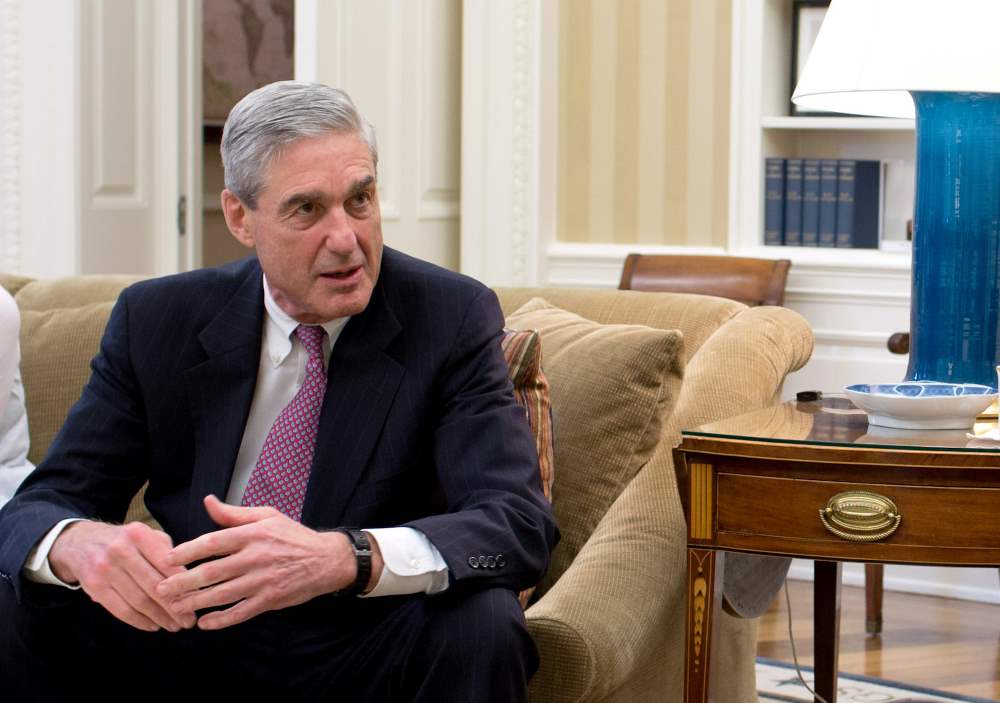Special counsel Robert Mueller reiterated Wednesday that charging President Trump with obstruction of justice was not an option his office could consider under Justice Department guidelines.
By: Masood Farivar
Mueller also announced the closure of his office after concluding in late March a two-year probe into Russian interference in the 2016 presidential election and whether Trump had obstructed justice.
Explaining his decision not to bring formal charges against Trump despite uncovering nearly a dozen instances of possible obstruction of justice, Mueller said he was barred by a long-standing Justice Department legal opinion that says a sitting president can’t be indicted.
“The special counsel’s office is part of the Department of Justice and, by regulation, it was bound by that department policy,” Mueller said in his first public remarks since his appointment more than two years ago. “Charging the president with a crime, therefore, was not an option we could consider.”
The former FBI director was appointed as special counsel in May 2017 after Trump fired then-FBI Director James Comey. Mueller was tasked with investigating any links or coordination between the Trump campaign and Russia, and whether Trump later interfered with the investigation.
Speaking from a podium at the Justice Department, Mueller said his decision not to charge Trump was informed in part by the view that the U.S. Constitution provides for a separate process for accusing a sitting president of wrongdoing, an apparent reference to the constitutional process of impeaching and removing a president.
“And beyond department policy, we were guided by principles of fairness,” Mueller said. “It would be unfair to potentially accuse somebody of a crime when there can be no court resolution of an actual charge.”
However, Mueller said that while there was “insufficient evidence” to charge Trump with a “broader conspiracy” during the election, he stressed that his investigation had not exonerated the president of wrongdoing, saying “if we had confidence that the president clearly did not commit a crime, we would have said that.”
Mueller’s final statement as special counsel appeared in part intended as a defense of his investigation against renewed criticism from Trump and his Republican allies.
Trump continues to deride the investigation as a “witch hunt” and a waste of money, while Attorney General William Barr has questioned the constitutionality of investigating Trump for obstruction of justice and launched a review to determine whether intelligence agencies engaged in improper “spying” of the Trump campaign.
Mueller rebutted those criticisms by noting that his investigation had gathered evidence of Russian efforts to “interfere in our political system.”
“They needed to be investigated and understood,” Mueller said of the Russian election meddling.
Because of the “paramount importance” of the investigation, Mueller said, it was critical for investigators to “obtain full and accurate information from every person we questioned.”
“When a subject of an investigation obstructs that investigation or lies to investigators, it strikes at the core of the government’s effort to find the truth and hold wrongdoers accountable,” he said.
In his 448-page confidential report on the investigation, Mueller wrote that he’d found insufficient evidence of a criminal conspiracy between the Trump presidential campaign and Moscow. As to whether Trump criminally obstructed the investigation, the special counsel wrote that while he could not charge the president, he could not exonerate him either.
That left it to the attorney general, who, in a controversial decision made in consultation with senior Justice Department officials, determined that Trump could not be charged with obstruction based on the evidence uncovered by Mueller. Barr said he made the determination irrespective of the Justice Department policy against charging a sitting president, even though Mueller suggested that it would have been inappropriate to do so.
Barr’s decision outraged Democrats, who have accused the attorney general of misrepresenting Mueller’s conclusions and had been pressing for the special counsel to testify before Congress. While not ruling out a congressional appearance, Mueller said, to the disappointment of many Democrats, that he would not go beyond the report if he were to testify.
“The report is my testimony,” he said. “I would not provide information beyond that which is already public in any appearance before Congress.”
In his statement, Mueller sought to play down reported friction with the attorney general over the manner in which the report was released to Congress and the public.
Barr initially sent a four-page summary of the report’s principal conclusions to Congress, followed by a redacted version of the full report last month. The Democratic-controlled House Judiciary Committee later voted to hold Barr in contempt of Congress for failing to release the full report along with the underlying evidence used to prepare it.
Mueller said that while he asked the attorney general to release “certain portions of the report” to Congress early on, he did “not question the attorney general’s good faith” in deciding to make the entire report public at a later date.
In a statement, White House press secretary Sarah Sanders said, “Mr. Mueller explicitly said that he has nothing to add beyond the report, and therefore, does not plan to testify before Congress.”
“The report was clear — there was no collusion, no conspiracy — and the Department of Justice confirmed there was no obstruction. Special counsel Mueller also stated that Attorney General Barr acted in good faith in his handling of the report,” Sanders said. “After two years, the special counsel is moving on with his life, and everyone else should do the same.”
In a tweet after Mueller’s statement, Trump wrote: “Nothing changes from the Mueller Report. There was insufficient evidence and therefore, in our Country, a person is innocent. The case is closed! Thank you.”
House Judiciary Committee Chairman Jerrold Nadler, D-N.Y., responded to Mueller’s remarks, saying, “It falls to Congress to respond to the crimes, lies and other wrongdoings of President Trump — and we will do so.” (VOA)





